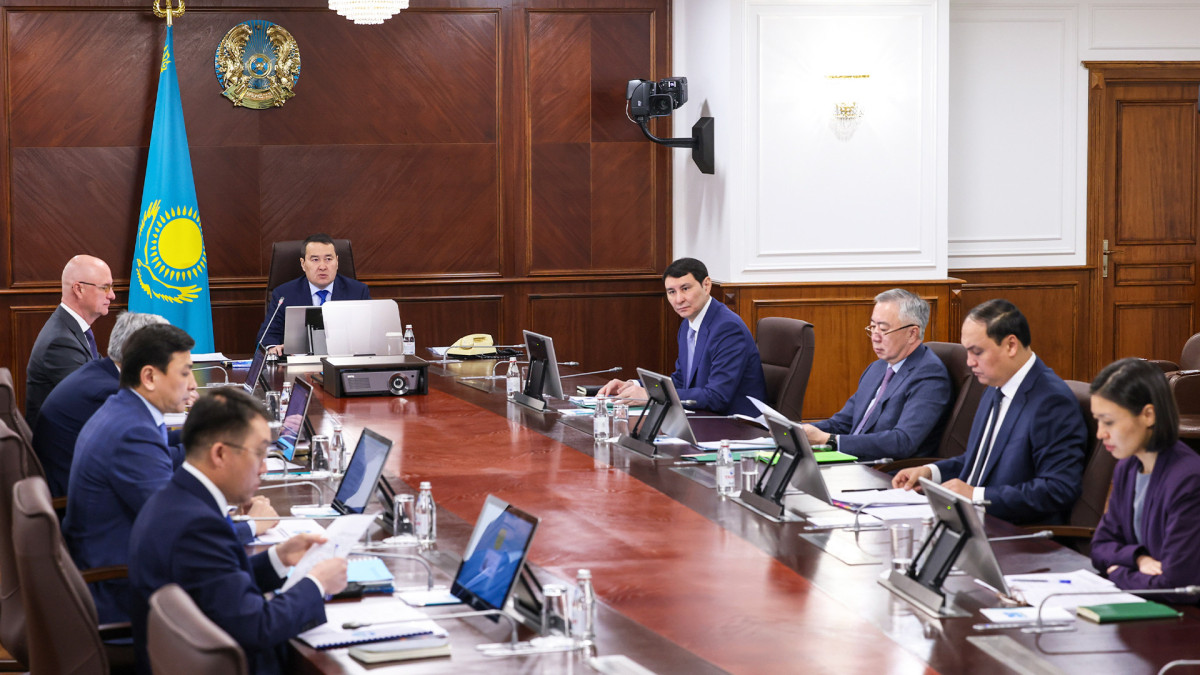
Dairy farms and vegetable storage facilities construction: measures to ensure food safety considered by Government

EL.KZ Информационно-познавательный портал
The progress of implementation of the Food Security Plan for 2022-2024 was considered at the Government session chaired by Prime Minister Alikhan Smailov, El.kz cites primeminister.kz.
The Minister of Agriculture Yerbol Karashukeyev reported that due to the measures taken by the end of 2022, the volume of food production increased by 3.9% and reached 2.9 trillion tenge. In particular, there was an increase in production of vegetable oil, flour, pasta, cereals, sausages and sugar. At the same time, there is a certain decline in dairy products, including butter, milk, cheese and cottage cheese, which is due to the low development of the raw material base.
To change the situation, a project has been launched to replicate the successful experience of the North Kazakhstan region in terms of preferential financing of construction of large commercial dairy farms (CDFs) through regional agricultural cooperatives. It is planned to allocate 100 billion tenge for these purposes in 2023, that will allow creation of 65 milk dairy farms with productive capacity of 373 thousand tons of milk a year. As a result domestic dairy plants will be provided with high quality raw materials, import dependency of milk in general will be considerably decreased. Plans for the following years include the construction of 50 more dairy farms.
The Minister added that for the main types of vegetables Kazakhstan fully meets the needs of the domestic market. Thus, in 2022 produced 4.1 million tons of potatoes, 621 thousand tons of carrots, 1.1 million tons of onions and 551 tons of cabbage. However, despite the significant volume of production, due to the lack of storage capacity in the winter-spring period there is a decrease in the supply of domestic vegetables on the market. To solve this problem a comprehensive plan for the construction and modernization of vegetable storage facilities until 2025 is being implemented. Within its framework in 2021-2022 37 projects with total storage capacity of over 200 thousand tons were launched. Until the end of 2023, the implementation of 29 projects for 111 thousand tons of products is planned.
Deputy Prime Minister – Minister of Trade and Integration Serik Zhumangarin told about work on restraining of prices for socially important food products. Akims of Atyrau region Serik Shapkenov, West Kazakhstan region Nariman Turegaliev, as well as Deputy Akim of Turkestan region Yermek Kenzhekhanuly reported on the measures implemented in the regions.
The Prime Minister stressed that ensuring food security becomes of paramount importance against the background of worsening geopolitical situation in the world and disruption of global supply chains of products and raw materials.
"In this regard, the Food Security Plan of the Republic of Kazakhstan for 2022-2024 was adopted in 2022. It provides for an increase of the area under crops and an increase in the yield of priority crops. We are also paying attention to increasing the livestock population and productivity," Alikhan Smailov said.
According to data from last year, there was a positive dynamics of development of the republic's agro-industrial complex by increasing the volume of agricultural production and growth of sown areas. Thus, the volume of gross agricultural production increased by 9% and amounted to 9.3 trillion tg. The main trigger of growth was an increase in the production of crop production by 15%.
He added that in addition to the implementation of the Plan, work is carried out to prevent unproductive mediation, monitoring and market regulation of prices for socially important food products.
The republic is also implementing a number of projects in the agro-industrial complex. For example, 65 dairy farms will be launched to further diversify. In addition, together with the World Organization for Animal Health, work is underway to obtain Kazakhstan's welfare status for particularly dangerous animal infections. This will expand markets and increase exports of meat products.
In parallel, the necessary infrastructure for storage of agricultural products is being created. To date, there are more than 1,200 storage facilities for vegetables and fruits with a total storage capacity of about 2 million tons. However, according to him, this is not enough - we need new vegetable storage facilities.
Alikhan Smailov also drew attention to the fact that there are complaints of farmers to the Unified State Information System of subsidies.
"The work on the implementation of the Plan of food security must be continued," the Head of Government said.
Summing up, Prime Minister instructed to update the comprehensive plan for the construction of new and modernization of existing vegetable storage facilities, taking into account the real needs of the market, to ensure the proper functioning of online platform of subsidies in the shortest possible time, to purchase the necessary socially important food, including from neighboring countries, and to reformat the Food Corporation, directing its activities to ensure food security and stabilize prices for socially important products by the end of June.

